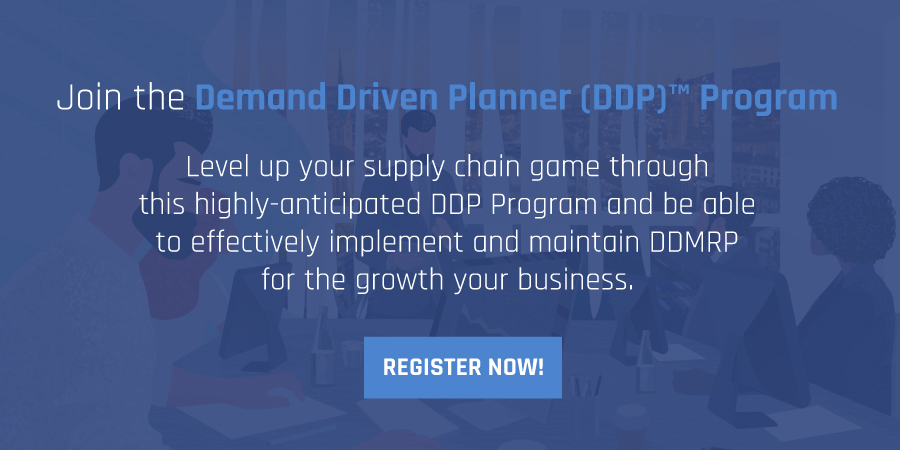
APICS Dictionary: Overview of the Latest Edition for 2023
March 10, 2023
DDP Class: What to Expect in June 2023
April 28, 2023In today’s fast-paced and ever-changing business environment, supply chain management has become critical to ensuring success and maintaining a competitive edge. Demand-driven planning is an innovative approach to supply chain management that focuses on managing and responding to customer demand effectively. With increasing customer expectations, global supply chain disruptions, and volatile market conditions, demand-driven planning has gained significant attention in recent years as a more agile and efficient way of managing supply chains.
One leading expert in demand-driven planning is our leader Patrick Rigoni, a renowned supply chain strategist and educator. Patrick has extensive experience in supply chain management and has helped numerous companies optimize their supply chain operations using demand-driven planning principles. In this article, we will explore the upcoming demand-driven planner classes Patrick Rigoni offers and how they can benefit professionals in the supply chain industry.
Understanding Demand-Driven Planning
Demand-driven planning is a strategic approach to supply chain management that prioritizes customer demand as the key driver of supply chain operations. Traditional supply chain management often relies on unreliable forecasts, which can result in overstocking or stockouts, leading to increased costs and decreased customer satisfaction. On the other hand, demand-driven planning uses real-time data and customer demand signals to drive supply chain operations, making it more agile and responsive to market changes.
What is a Demand Driven Planner Program?
The Demand Driven Planner (DDP)™ Program is tailored for planning, purchasing, and supply chain professionals accountable for implementing and managing a Demand Driven Material Requirements Planning (DDMRP) implementation. Developed by the esteemed experts on DDMRP at the Demand Driven Institute, the DDP Program encompasses 13 comprehensive modules that provide in-depth education on DDMRP principles and practices. This program is the official preparatory course for the Demand Driven Planner Professional (DDPP)™ certification exam.
Patrick Rigoni – A Renowned Expert in Demand-Driven Planning

Patrick Rigoni is a highly respected expert in supply chain management with extensive experience in implementing demand-driven planning principles in various industries. Patrick is a certified instructor for the Demand Driven Institute (DDI), a global leader in demand-driven education and certification. He has trained and mentored numerous supply chain professionals worldwide, helping them to optimize their supply chain operations using demand-driven planning. Patrick has a strong track record of successfully implementing demand-driven planning in diverse industries, including manufacturing, distribution, retail, and service. He has worked with companies of all sizes, from small businesses to multinational corporations, helping them to achieve significant improvements in their supply chain performance. As a demand-driven planning practitioner and educator, Patrick brings a wealth of practical experience and industry insights to his training classes. His classes are known for their engaging and interactive style. They combine theory with real-world examples, case studies, and practical exercises to ensure participants can apply the concepts in their organizations.
The Upcoming Demand-Driven Planner Classes by Patrick Rigoni
Demand-driven planning is gaining popularity in the supply chain industry due to its ability to improve operational efficiency, reduce costs, and enhance customer satisfaction.
With the growing demand for expertise in this area, Patrick Rigoni’s upcoming demand-driven planner classes on June 22 and 23 in Zurich (time 09:00 to 18:00) offer an excellent opportunity for supply chain professionals to enhance their skills and stay ahead in the competitive business landscape.

What to Expect from Patrick Rigoni’s Demand-Driven Planner Classes?
Patrick Rigoni’s demand-driven planner classes are designed to provide participants with comprehensive training on demand-driven planning principles, practices, and tools. The classes suit supply chain professionals at all levels, including managers, planners, analysts, and executives, who seek in-depth knowledge of demand-driven planning and implement it in their organizations.
The highly interactive classes incorporate various teaching methods, such as lectures, discussions, case studies, simulations, and group exercises, to ensure a well-rounded learning experience. Patrick’s practical approach and real-world examples make the classes engaging and applicable to real-life supply chain scenarios.
Some of the key topics covered in Rigoni’s demand-driven planner classes include:
Module 1: Planning in the Modern World
In this module, we examine how traditional planning needs help to cope with the increasing volatility, uncertainty, complexity, and ambiguity of the modern world.
Module 2: The Significance of Flow
Here, we delve into the fundamental concept of Flow and Plossl’s law: “All benefits are directly proportional to the speed of flow of material and information.” We explore the reasons behind this relationship, establish the logical connections between Flow and company ROI, and introduce the concept of “Relevance.” We interpret the Bullwhip Effect as a distortion of relevant information and materials.
Module 3: Unlocking a Solution – Decoupling
After analyzing and identifying the root causes of the Bullwhip Effect and inventory misalignment, we can address a key element of the solution: decoupling.
Module 4: Embracing Demand-Driven Approach
In this module, we discuss the true meaning of being demand driven, introduce the Demand Driven Operating Model (DDOM), and introduce DDMRP and its five components.
Module 5: Strategic Positioning of Inventory Buffers
In Module 5, we look at the first of the five components. We discuss the six factors to consider when selecting the positioning of decoupling stock buffers. We introduce the concept of Decoupled Lead Time and learn how to analyze a Bill of Material to identify optimal leverage points.
Module 6: Positioning Buffers in Distribution Network
In Module 6, we continue the discussion on buffer positioning, focusing on the distribution network.
Module 7: Buffer Profiles and Levels
Now that we know where to position the buffers, we can move on to the second component of DDMRP, which is to determine the size of the buffers. We discuss the functions of the different buffer zones (red, yellow, and green), the parameters used to calculate the size of the zones, and the formula for the calculations.
Module 8: Dynamic Adjustment of Buffers
With positioned and sized buffers, we now face the challenge of managing a dynamic and ever-changing world. Demand constantly changes (rising, falling, promotions, seasonality), and supply events require constant adaptation (maintenance, holiday seasons, etc.). Products go through their life cycle of launch, maturity, substitution, and decline. All of this needs to be managed, and this is the third component of DDMRP. We will learn how to adapt the buffers to cope with this constant change.
Module 9: Demand-Driven Planning
We now enter the fourth component of DDMRP. Here, we learn the core equation of DDMRP: the Net Flow Equation and how this equation is used to trigger replenishment orders. This equation generates all supply orders (stock transfer, manufacturing, purchasing). We will also see how dependent demand is propagated through the Bill of Material in DDMRP (Decoupled Explosion) and explore the technique of Prioritized Share, which is used to manage full truck optimization and fair allocation of scarce (or excess) material.
Module 10: Highly Visible and Collaborative Execution
We arrive at the fifth and final component of DDMRP. Here, we learn how to manage priorities in DDMRP. Every open order comes with a clear priority. We learn about current and projected buffer status alerts, synchronization alerts, and lead time alerts.
Module 11: DDMRP and the Operational Environment
Now that we have explored the five components in depth, we can take a step back and consider the implications of DDMRP on the operational environment. We discuss the impact of DDMRP on scheduling and WIP priority management.
Module 12: Demand-Driven Sales and Operation Planning
We continue the discussion with the Sales and Operations Planning. Here we look at the DDMRP-specific metrics that allow us to understand how the model is performing and how to adapt it and its parameter to gain ever better performance. We will also discuss how we can project model performance into the future.
Module 13: Program Summary
As we reach the end of our journey, in this module, we will provide a comprehensive review
of the quantifiable benefits of DDMRP. We will also outline a roadmap for starting with DDMRP implementation and discuss the process for preparing, registering, and successfully passing the Demand Driven Planner Professional (DDPP) certification test.
Benefits of Joining Patrick Rigoni’s Demand-Driven Planner Classes
Joining Patrick Rigoni’s demand-driven planner classes can provide participants with numerous benefits, including:
In-depth knowledge of demand-driven planning: Rigoni’s classes offer a comprehensive understanding of demand-driven planning principles, practices, and tools, enabling participants to become proficient in this innovative supply chain approach.
Practical application: Patrick’s practical approach and real-world examples help participants apply the concepts learned in class to their organizations, making the training relevant and applicable to their day-to-day work.
Enhanced skills and expertise: Rigoni’s classes can help participants enhance their skills and expertise in supply chain management, making them more competitive in the job market and positioning them as valuable assets to their organizations.
Access to cutting-edge tools and techniques: Patrick’s classes cover the latest tools and techniques for demand-driven planning, including adaptive systems, analytics, and simulation tools. Participants can gain hands-on experience with these advanced tools, enabling them to leverage technology and data for effective demand-driven planning and control.

Who Can Benefit from Patrick Rigoni’s Demand-Driven Planner Classes?
Patrick Rigoni’s demand-driven planner classes are suitable for a wide range of supply chain professionals, including Planning Managers and Directors, Demand and Supply Planners, Purchasing Managers and Directors, Operations Managers and Directors, and Operational Excellence (Six Sigma/Lean/ToC) specialists. Also suitable for a VP SCM who wants to get an in-depth understanding of DDMRP.
How to Join Patrick Rigoni’s Demand-Driven Planner Classes?
Register for Patrick Rigoni’s Demand-Driven Planner Classes!
Fill up the minimum required registration information, with your full name, company, email and phone number.
The registration fee is CHF 1290, excluding VAT. The payment will provide you with the following:
- 2-day course
- Full-colour course book
- Access to the member area of the Demand Driven Institute site containing updated course material, exam preparation exercises and videos
- Follow-up test questions for DDPP exam preparation.
Conclusion
Demand-driven planning is a critical aspect of modern supply chain management. Patrick Rigoni’s demand-driven planner classes offer an excellent opportunity for supply chain professionals to enhance their skills and knowledge in this area.
By joining Patrick’s classes, participants can gain a competitive edge, expand their professional network, and contribute to their organizations’ success. If you want to optimize your supply chain operations and stay ahead in the dynamic supply chain landscape, joining Patrick Rigoni’s demand-driven planner classes can be a wise investment in your professional growth and development.
Join the Demand Driven Planner Professional (DDPP)™.






